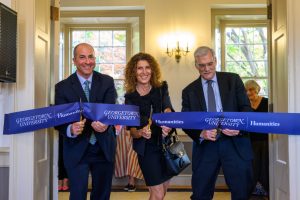The Georgetown Humanities Initiative, which organizes humanities scholarship and projects on campus, inaugurated its new space in Old North with the goal of expanding interdisciplinary collaboration and recentering the humanities in Georgetown University’s culture Oct. 25.
This location, which represents the initiative’s first dedicated physical space, was unveiled at a ribbon-cutting ceremony attended by students, faculty and donors, featuring a large conference room, offices for visiting scholars and a symbolic location at the heart of campus. The McCourt School of Public Policy previously occupied the space before its move to the Capitol Campus this summer.

Andrew Sobanet, interim dean of the College of Arts & Sciences, said the initiative’s new space will allow it to take on a more prominent role on campus.
“The humanities are the cornerstone of a Georgetown education, not just the College of Arts & Sciences, but for every Georgetown student,” Sobanet said at the ribbon-cutting. “It’s an extension of the commitments we make as a community to foster interdisciplinary research, teaching and public facing projects that demonstrate the enduring value of the humanities for a better understanding of the human condition.”
Founded in 2019, the Georgetown Humanities Initiative provides funding and support for student and faculty research across humanities disciplines. In 2021, Nicoletta Pireddu, the initiative’s director and a professor in the department of Italian, established a student advisory board for the initiative and hopes to have students to moderate future events.
Pireddu said the space enables the initiative to serve as a bridge between disciplines on campus.
“I am appreciating not only the beauty of the space, but also the flexibility because the room is big enough to have not only seminars, but also lectures,” Pireddu told The Hoya. “It gives us an independence that I would have never dreamed of.”
Devon Wald (CAS ’28), who joined the student board this fall, said she wants to expand the presence of the humanities on campus.
“We’re looking to open up the position of humanities to a wider range of Georgetown,” Wald told The Hoya. “People often kind of overlook the humanities. So I’m hoping to make sure that these events and opportunities are available to the general student body.”
Though the Georgetown Humanities Initiative currently occupies only the second floor of Old North, administrators envision this space as the first step in creating a “Humanities Quad” around Dahlgren Quad, which is currently home to the English, theology, philosophy and classics departments.
The project will also feature a renovated McNeir Auditorium in New North, partially funded by a grant from the National Endowment for the Humanities (NEH), a government agency that finances humanities-related projects. The grant requires Georgetown to raise approximately three times the $750,000 the NEH awarded.
Provost Robert Groves said that the unveiling of the initiative’s new space foreshadows the establishment of a Humanities Center, pending funding, and represents an institutional commitment to humanities education.
“We’re dedicating this as a humanities initiative, but this nomenclature needs definition,” Groves said at the ribbon cutting. “I will go anywhere to try to raise money for the humanities center and fill this place out and ensure sustainability of everything you want to do.”
Pireddu said with the existing funding, the initiative has been able to develop programming to support both student and faculty research, interdisciplinary collaboration, guest speakers and resources for the Georgetown community.
“The humanities have always been a fundamental component of Georgetown’s identity, but with the creation of the Georgetown Humanities Initiative, we have been able to demonstrate that we are much more than a cluster of juxtaposed disciplines,” Pireddu said. “We are exploring exciting public-facing and experiential learning opportunities, and we are engaged in interdepartmental collaborations involving faculty and students, be it when we approach past ages or when we tackle the challenges of our complex present. Our humanities projects make individual disciplines speak to one another.”
Pireddu added that housing the initiative in the oldest academic building on campus is especially meaningful as the program expands.
“Thanks to this beautiful space, Georgetown Humanities can finally be not only an intellectual endeavor, but also a physical reality, a distinctive forum for hosting events, exchanging ideas and promoting a sense of community and welcoming our forward-looking program in this historic location,” Pireddu said. “Having space in the oldest building on campus nicely expresses, in my view, our way of conjugating respect for tradition and commitment to innovation.”